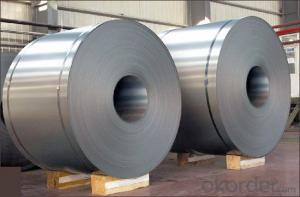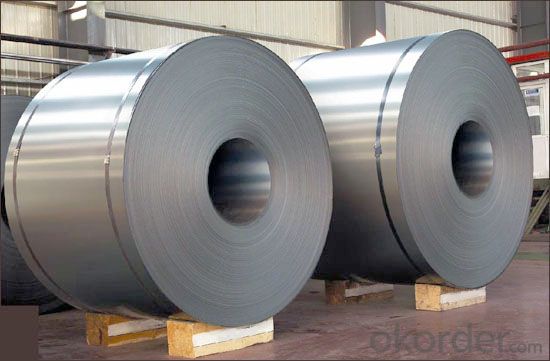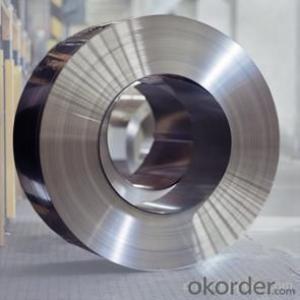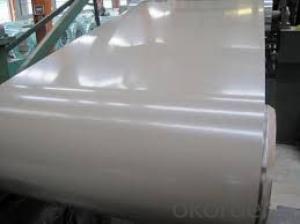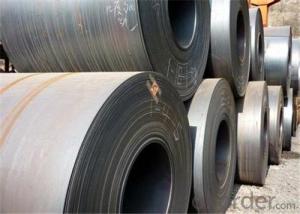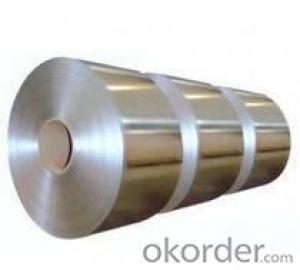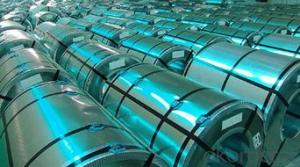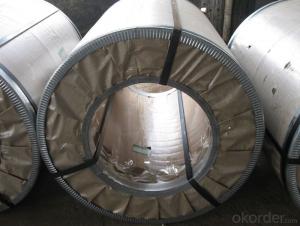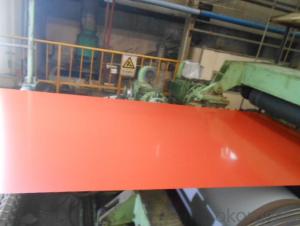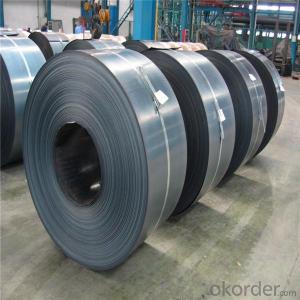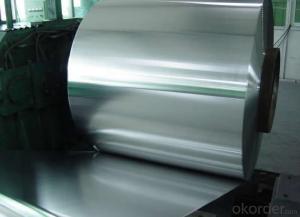Cold Rolled Steel Coil with Low Price in China
- Loading Port:
- China main port
- Payment Terms:
- TT OR LC
- Min Order Qty:
- 50 m.t.
- Supply Capability:
- 10000 m.t./month
OKorder Service Pledge
OKorder Financial Service
You Might Also Like
Cold Rolled Steel Coil with China Best Price
1.Cold Rolled Steel Coil with Low Price in China Description:
The raw material of cold rolled steel coil/sheet is high quality hot rolled product, and after pickling continuous rolling, degreasing, annealing,skin pass,slitting and cut to length line etc. Along with it many kinds of new technology and new process of global cold rolling production have been applied. Therefore the quality of the goods could be guaranteed.
2.Main Features of Cold Rolled Steel Coil with Low Price:
• Excellent process capability
• Workability, durability
• Excellent heat resistance performance
• Good visual effect
3. Cold Rolled Steel Images:
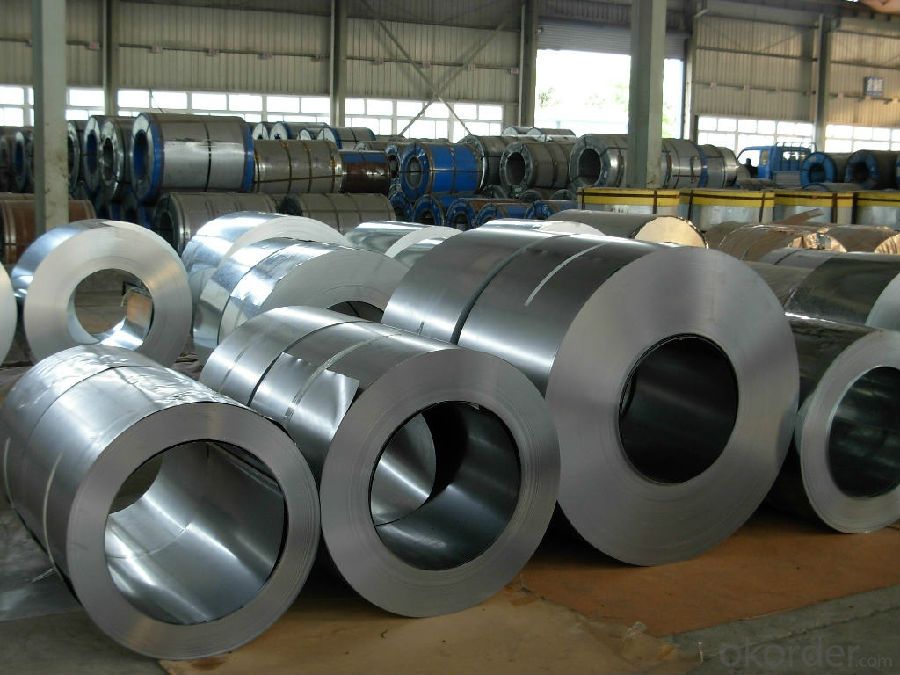
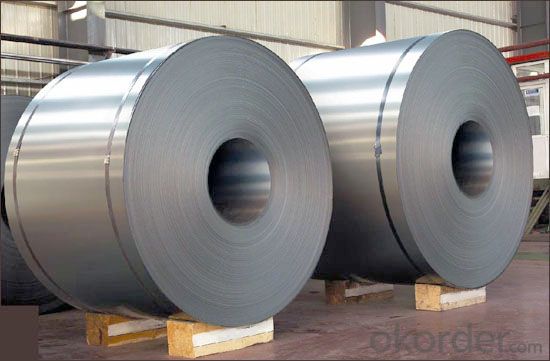
4.Cold Rolled Steel Specification:
Standard:AISI,ASTM,DIN,GB,JIS,JIS G3302 ASTM 653M EN10142
Grade: Q195~Q345
Thickness: 0.16mm~2.0mm
Width: 1250mm MAX
Coil weight:3-12 MT
FAQ
1.How to guarantee the quality of the products?
We have established the international advanced quality management system,every link from raw material to final product we have strict quality test.
2. How long can we receive the product after purchase?
Usually within thirty working days after receiving buyer’s advance payment or LC. We will arrange the factory manufacturing as soon as possible. The cargo readiness usually takes 15-25 days, but the shipment will depend on the vessel situation.
- Q: How are steel coils used in the manufacturing of shock absorbers?
- Steel coils are used in the manufacturing of shock absorbers primarily as a spring component. These coils provide the required strength and flexibility to absorb and dampen the impact and vibrations experienced by the vehicle. When compressed or expanded, the steel coils store and release energy, ensuring a smoother and more controlled ride for the driver and passengers.
- Q: benchmade mpr with m390 steel knife. Is it better than d2 s30v or 154cm steel?
- well first of all u hav 2 get a mpR490 STEEL STOOLMADE
- Q: Are steel coils affected by magnetic fields?
- Yes, steel coils can be affected by magnetic fields. Steel is a ferromagnetic material, which means it can be magnetized or attracted to magnets. When a magnetic field is applied to a steel coil, it can induce a magnetic field within the coil, causing the coil to become magnetized. This can have several effects depending on the strength and duration of the magnetic field. If the magnetic field is strong and the coil is exposed to it for a significant amount of time, it can cause the steel coil to retain some magnetism even after the magnetic field is removed. This can be problematic in certain applications where a non-magnetic material is required, as the magnetized steel coil may attract or interfere with other nearby objects. On the other hand, if the magnetic field is rapidly changing or fluctuating, it can induce electrical currents within the steel coil through electromagnetic induction. These induced currents, known as eddy currents, can generate heat within the coil, leading to energy losses and potential damage to the coil. Therefore, it is important to consider the effects of magnetic fields on steel coils in various applications. Protective measures such as shielding or demagnetizing processes may be necessary to minimize the impact of magnetic fields on steel coils when required.
- Q: Can someone help me...i have a diagram and were supposed to calculate the steel tonnage needed for the pictre. Can someone tell me step by step what i need to do (ex:find area of ...)
- Find the volume of steel and then multiply that by the density of the steel.
- Q: How long do steel coils typically last?
- Steel coils typically last for decades. The lifespan of steel coils can vary based on several factors including the quality of the steel used, the level of maintenance and care, and the specific application they are utilized in. Generally, steel coils are designed to be durable and resistant to corrosion, ensuring a long lifespan. With proper care, regular maintenance, and adherence to recommended usage guidelines, steel coils can last anywhere from 20 to 50 years or even longer. However, it is important to note that the lifespan can be influenced by external factors such as exposure to harsh environments, extreme weather conditions, and the level of stress or load they are subjected to.
- Q: What are the main characteristics of steel coils?
- The main characteristics of steel coils include their high strength and durability, excellent corrosion resistance, and ability to be easily formed and shaped. They are typically made from carbon steel and come in various widths, thicknesses, and lengths. Steel coils are commonly used in a wide range of industries such as construction, automotive, and manufacturing for applications such as roofing, structural components, and electrical appliances.
- Q: What materials are used to make steel coils?
- Steel coils are primarily made from iron ore, coke, limestone, and scrap steel.
- Q: What are the different types of steel coil finishes?
- There are several different types of steel coil finishes, including mill finish, galvanized finish, painted finish, and stainless steel finish.
- Q: What are the common problems encountered with steel coils during production?
- During production, steel coils often encounter various common problems. Among them, coil slippage is one of the most frequent issues, occurring when the coils shift or slide out of place during handling or transportation. This can result in damage to the coils or pose a safety risk to workers. Another problem commonly encountered is coil rusting or corrosion. If steel coils come into contact with moisture or are not adequately protected, they are susceptible to rust. This can compromise the structural integrity of the coils and lead to product defects or failure. Coil breakage is also a frequent problem that arises when the coils are subjected to excessive stress or tension, causing them to crack or break. Improper handling or storage, as well as production issues such as inadequate rolling or cooling processes, can contribute to coil breakage. Coil surface defects are another issue commonly observed. These defects can manifest as scratches, dents, or uneven surfaces on the coils. Surface defects can compromise the appearance and quality of the final product, rendering it unsuitable for certain applications. Lastly, coil contamination is a problem that can occur during production. Contaminants such as dirt, oil, or foreign particles can adhere to the surface of the coils, leading to quality issues or difficulties in further processing. Contamination can arise from improper handling, inadequate cleaning processes, or poor environmental control. To address these common problems, it is essential to adopt proper handling and storage practices. This involves using appropriate lifting and transporting equipment, ensuring the coils are stored in a dry and clean environment, and implementing effective rust prevention measures. Regular inspections and quality control checks can also aid in identifying and addressing any issues early on, preventing further damage and ensuring the production of high-quality steel coils.
- Q: Steels like YHB-2, MVS-8, and SK-5. Also if you know anything about these steels that would be helpful.
- White steel is a common shorthand name for white paper steel (shirogami hagane) which can be any of several fairly simple high carbon, water hardening steel grades. The carbon content varies by grade, and runs from 0.8 to 1.4%. The range of carbon content within a grade is a tight 0.1%. For example, the carbon content of Shirogami Hagani No1A is specified to be between 1.3 and 1.4%. Each grade also contains 0.1-0.2% silicon and 0.2-0.3% manganese, and only trace amounts of the impurities sulfur and phosphorus. Blue paper steel (aogami hagane) is also offered in several grades, with carbon content ranging similarly to the white grades. However, blue steel contains the additional alloying elements chromium and tungsten, and one grade (aogami super) also contains molybdenum and vanadium. The blue steels can be quenched in water or oil, whereas most of the white grades need a faster quench and require water.
Send your message to us
Cold Rolled Steel Coil with Low Price in China
- Loading Port:
- China main port
- Payment Terms:
- TT OR LC
- Min Order Qty:
- 50 m.t.
- Supply Capability:
- 10000 m.t./month
OKorder Service Pledge
OKorder Financial Service
Similar products
Hot products
Hot Searches
Related keywords
